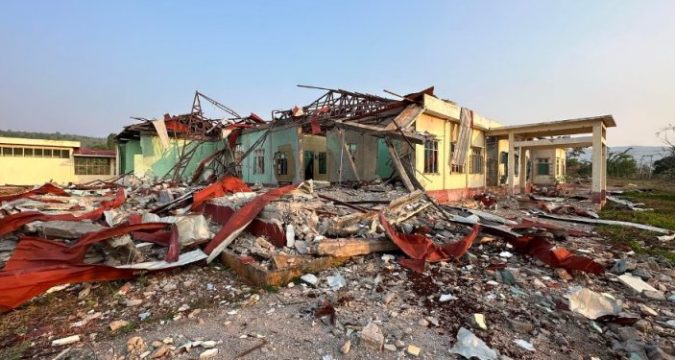
YANGON (AsiaNews/Agencies): Justice for Myanmar, a human rights organisation, condemned the Association of Southeast Asian Nations [ASEAN] for its decision to hold a conference of air force chiefs that will be chaired by Myanmar’s air force chief, General Htun Aung, while fighting rages on in much of the country between the military, which seized power in a coup in February 2021, and resistance forces.
Myanmar’s air force has conducted hundreds of airstrikes against civilians.
The meeting is set to take place in Myanmar’s capital of Naypyidaw between September 12 and 15.
ASEAN’s diplomatic efforts to solve the Myanmar crisis so far, boil down to a five-point peace plan that has never been implemented. Divisions within the regional organisation have prevented real action to curb violence in the country.
Yadanar Maung, spokesperson of Justice for Myanmar, said, “ASEAN is legitimising and emboldening war criminals through its defence and security cooperation, endangering the lives of Myanmase people and worsening the crisis.”
According to the Armed Conflict Location and Event Data Project, about a thousand people were killed between January 2022 and July 2023 in 930 airstrikes under General Htun Aung’s command.
The Assistance Association for Political Prisoners, which has monitored civilian deaths and arrests since the coup, reported on August 24 that the number of civilians killed by regime forces topped 4,000, an average of 130 noncombatant casualties per month.
The military junta, however, has repeatedly blocked the delivery of humanitarian aid fearing that charities and UN charities will support resistance
Sagaing, where resistance forces are concentrated, has borne the brunt of recent government raids, massacres, shelling, airstrikes both in rural and urban areas, with thousands of homes set on fire and almost 1,800 civilians killed—45 per cent of the total.
The Myanmese regime recently admitted that the humanitarian crisis is getting worse. Junta leader, senior General Min Aung Hlaing, acknowledged that a third of Myanmar’s population is in need of humanitarian assistance, asking his ministers to better coordinate local and foreign aid.
United Nations Office for the Coordination of Humanitarian Affairs reported that more than 1.9 million people have been displaced by the fighting, mainly in Kachin and Chin States, and in the Mandalay and Sagaing regions. A fivefold increase in less than three years.
The military junta, however, has repeatedly blocked the delivery of humanitarian aid fearing that charities and UN agencies will support resistance forces. In Rakhine State, hit by Cyclone Mocha in May, a million displaced people have not yet received adequate assistance.
Instead, the regime has restricted aid, setting up a 19-member committee to draft a new law on domestic and foreign NGOs, intended to prevent NGO from interfering in the country’s affairs with financial and other assistance from foreign countries.
In October 2022, General Hlaing had the legislation amended, tightening sanctions against those with links to “terrorist” groups [label used by the junta for resistance forces and the government-in-exile], requiring humanitarian groups to reserve 40 per cent of seats on their board to Myanmese nationals.








